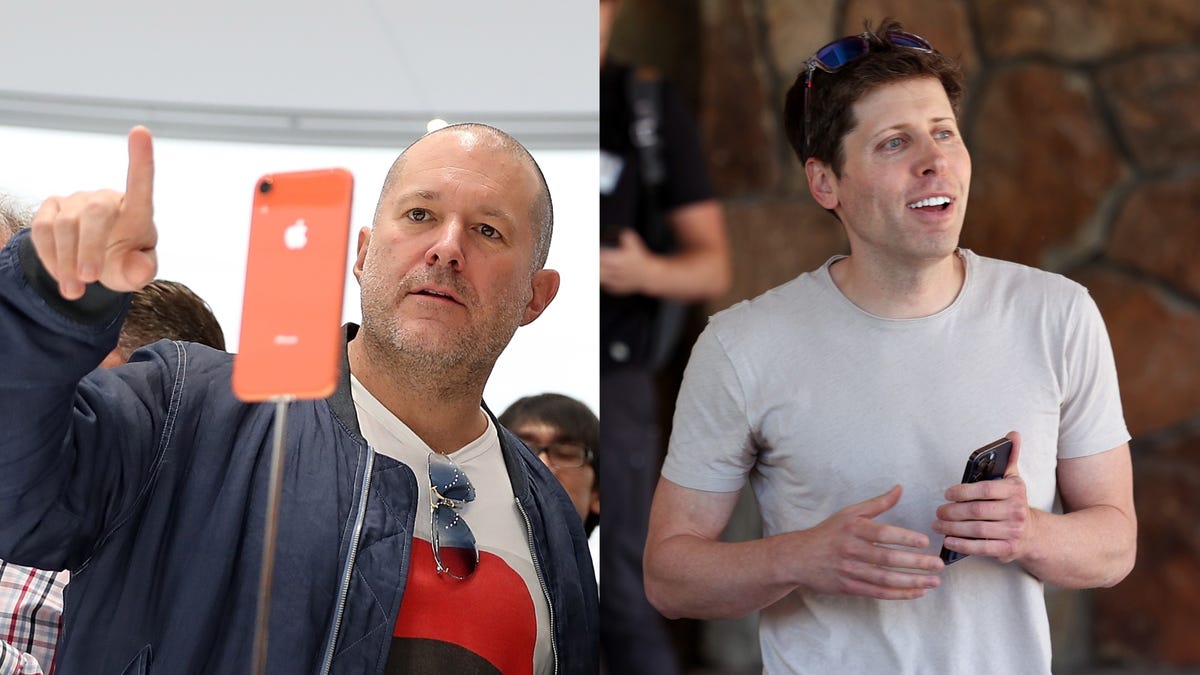Plan is to reinvent the smartphone with AI, in the same way the touchscreen on the iPhone reinvented the smartphone.
Particularly interesting given ChatGPTs latest move to have voice recognition and an AI voice respond. If you haven’t tried it, it’s kind of neat. This morning I had a conversation with ChatGPT with my phone in my pocket, all done overy Bluetooth headphones like I was on a call. It was actually a lot more natural then I expected. I wonder what it would look like if that kind of tech was front and center in a smartphone.
I’ve included a few snippets from the article below, but the TLDR is, big names and big money are behind brainstorming plans to make an AI first centered smartphone, a plan to reinvent the form factor. The article also points to declining smartphone sails as evidence that the public is tired of the same old slab every year, so this could be an interesting time for this to come out.
I guess it’s relevant to mention whatever the fuck the Humane AI pin is: The Humane Ai Pin makes its debut on the runway at Paris Fashion Week https://www.theverge.com/2023/9/30/23897065/humane-ai-pin-coperni-paris-fashion-week
From the article: After rumors began to swirl that Apple alum Jony Ive and OpenAI CEO Sam Altman were having collaborative talks on a mysterious piece of AI hardware, it appears that the pair are indeed trying to corner the smartphone market. The two are reportedly discussing a collaboration on a new kind of smartphone device with $1 billion in backing from Masayoshi Son’s Softbank.
…according to the outlet, the duo are looking to create a device that provides a more “natural and intuitive way” to interact with AI. The nascent idea is to take a ground-up approach to redesigning the smartphone in the same way that Ive did with touchscreens so many years ago. One source told the Financial Times that the plan is to make the “iPhone of artificial intelligence.” Softbank CEO Masayoshi Son is also involved in the venture, with the financial holding group putting up a massive $1 billion toward the effort. Son has also reportedly pitched Arm, a chip designer in which SoftBank has a 90% stake, for involvement.
While it’s still not clear what the end goal of the product talks will be (or if anything will come of them at all, really), it does seem like the general public has become fatigued with the same-y rollout of a slightly better smartphone slab year after year. Tech market analysis firm Canalys revealed in a report earlier this month that smartphone sales have experienced a significant decline in North America. The report indicates that iPhone sales have fallen 22% year-over-year, with an expected decline of 12% in 2023. The numbers are pretty staggering, especially fresh off the release of the iPhone 15, and could be an indicator that people are getting fatigued of the hottest new tech gadgets.
AI has some legitimate applications but I feel like this is like a mirror of the “PUT BLOCKCHAIN IN EVERYTHING” hype
Just be glad they’ve moved onto a new obsession and that video card prices are finally coming down.
Just wait till you find out how AIs are trained/ran
Here’s hoping NVIDIA drops the personal GPU market , and AMD taking the mantle
A list of business fads in the tech world, from what I remember:
- Personal computers
- Multimedia
- Networks: Internet, E-mail, World Wide Web, all the stupid names for it like cyberspace, information superhighway.
- Web 2.0: AJAX and the long tail, user generated content, democratized information exchange and discovery without gatekeepers
- Social Media
- The Cloud
- Mobile Apps
- Blockchain, cryptocurrency, decentralized finance, smart contracts, Web 3.0, NFTs
- VR, AR, XR
- Generative AI, LLMs, GANs, Deep Learning, etc.
It’s a good list but the blockchain line really jumps out at me for being almost 100% hype and based around a largely useless technology. The rest were real advancements that maybe had a ridiculous hype cycle before settling into an unspectacular but useful phase.
Not sure why this got downvoted. It totally tracks. The current VR and AI fads aren’t even the first times we’ve had fads on those subjects. Yes, we will get some new tech of varying utility out of each fad, but the overhype is real.
I think by painting it as a bunch of buzzwords people were reading into the comment as either an endorsement that the items in the list were the same, which isn’t what I meant. I’m just trying to give a description of the various buzzwords I remember being thrown around by a combination of scammers, hucksters, cargo cultists simply mimicking the latest trends without understanding them, and actual legitimate business models, without actually giving my views on which ones actually delivered on the hype, which ones overpromised, or which ones totally fizzed out (or are going to).
Not everything needs AI, but some things would definitely be helped by it. I have blind family members and there are a lot of problems that generative AI are solving that I think can help them directly.
Must be nice to be able to throw money at things like this.
The reason smart phone sales have dropped — in my armchair point of view — is that everyone has a cell phone already, and the normal person doesn’t need to update their phone every year. I feel like I’m a pretty technical dude, but I still have a iPhone 12Pro because it still runs everything worth using. And it’s still fast. It’s less that I’m tired of this form factor, and more that I literally don’t need a new phone. And I feel like that’s most people most of the time.
They should’ve jumped on the modular phone idea. We don’t need a new phone every year but we could probably be talked into a new camera; a new processor; a new screen; a new antenna; etc etc
“The new antenna upgrades your wifi speed by 3%” and people would be lining up to snap that fancy new mod in.
I don’t think that is big - no one buys tower PCs anymore where you already can do that sort of thing, because there actually isn’t a benefit to upgrading most parts anymore. I am still using my android phone from 2019 because it literally does everything I could want a phone to do. I may be lacking vision, but I also don’t really see what AI is going to do here to change the form factor. The reason the slab has endured IMO is that it is a swiss army knife of the pocket computing device. You don’t want to go back toa phone with a tiny screen and just talk at AI because that’s a terrible web browser ui. It’s a terrible book or comic reading ui. It’s a terrible gaming ui. It’s bad for displaying chat, pictures, videos etc.
AI will probably help voice to text and vice versa so we can talk text instead of making a phone call better. I can see it helping anytime you don’t want to go into your phone, but I also see it as a new interface roughly like Siri. And no one thought that Siri was the iPhone of anything.
I just don’t think AI first makes sense. Everyone wants the Star Trek computer until they actually try and use it by talking at a computer. It’s just not efficient imo.
no one buys tower PCs anymore
Is this correct? Literally typing this from a ‘tower PC’. I would never buy anything else (I use my PC for writing music, a little animating, a lot of gaming). Almost every entry on the site I’ve bought my last 3 PCs & laptops from is a ‘tower PC’. I know not every PC user is a ‘power user’ but the idea that people don’t want to upgrade their PCs anymore is surely not correct? ‘There isn’t a benefit to upgrading most parts’ what, like a GPU? Or a CPU? Or RAM? Or going from an HDD to SSD? Or adding thunderbolt capability? I’d be surprised to find a majority of PC users weren’t upgrading any parts in a 3-year cycle.
Interested what phone you have. I persevered with a Samsung Galaxy S9 for many years but it was just feeling so slow & clunky even after a refresh & new battery. Got a Pixel 7a this year, blocked all the intrusive tracking, swapped the loader for a custom, it’s brilliant.
https://windowsreport.com/desktop-vs-laptop-market-share/ implies that desktops market share is shrinking, but it’s not as low as I thought it was. That said, many desktops I see out there in business (and at work) are “tiny” ones that you can’t upgrade either, they’re a laptop without the screen built in.
When I talk about a benefit to upgrading most parts, I mean that if you go buy say a general consumer model at Wal-Mart, you probably can’t just change out the CPU because the sockets change frequently. The RAM may have a spare slot, or be able to be increased in size, which is probably the most bang for your buck unless your PC happens to be a slow spinning disk. Most of the pre-built PCs have a PSU sized exactly for what’s in the box, and there usually isn’t a discrete GPU. Not only that, but there aren’t extra plugs, so you’re not plugging in a PCIe GPU without swapping out the PSU.
All things I’d imagine most computer buyers don’t or can’t do. They buy a box, and when it “dies” they buy a new box. I’ve only met PC Gamers online in the last … 15 years or so. Everyone else uses a console, phone, or gave up gaming.
No one I know upgrades PCs in a 3 year cycle and haven’t since the aughts. This is because high end PCs from 2010 worked straight through 2022 for people - Windows 11 is pushing new PCs, in so far as people care to upgrade / patch. Most people want the cheapest PC possible, which means they’re not upgrading anything till it breaks. And they upgrade the entire PC at a time.
As to the phone I have, I have a Xiaomi Mi 8 Lite from 2019. No desire to upgrade it till it dies.
I think it might be good for older people or people who struggle with technology, depending on its complexity and integration with other stuff. I absolutely hate talking to my phone, but a lot of older people I know do almost everything via google assistant. I could see a lot of use for accessability, but I personally probably wouldn’t use it.
Project Ara was one of the most disappointing abandoned Google products.
In my personal case the reason is because steadily smartphone prices have crept up and up to the point where I’m paying more for a 2 year old Z Fold than I would for a brand new Note 7 on launch day.
Wouldn’t you know, when inflation hurts my wallet, the first thing I cut is unnecessary luxury expenses like the latest Smartphone. I’m due for an upgrade but I’m not inclined to drop 1200 on a new phone when my Note 10+ is running like new.
I’m still on an XS Max, and the only reason I’m upgrading to the 15 is because I want 120hz… and more space. …and better cameras in low-light for cat pictures.
My XS Max is still extremely fast, which boggles my mind. It’s five years old. Original battery, and it lasts all day. Bonkers.
it happened with desktops and laptops, now it’s happened with smartphones
For sure, I feel the same. But I think part of the disconnect is around the word “need.” Because there is “need” as in “I will not survive without this thing, or my life will be more difficult and unpleasant without it” and then there is “need” in the marketing sense, the desire to buy a thing that is fun and interesting and exciting. The consumerism desire to fill the whole in your life with that new purchase that you hope will finally make you happy.
For the latter definition of “need,” smartphones used to do a good job of triggering it. Every year there was something new and a flashy about the latest batch of phones, some new must have feature. If you didn’t get the new phone, and your friends did, you’d feel like your missing out, like your lugging around some obsolete junk.
In the last few years (or more), new smartphones have just been modest performance upgrades, slightly better cameras, and that’s about it. The new iPhone 15 has an action button, neat. You don’t “need” to upgrade from your 12 because you don’t feel like your missing out on anything major, and your right.
It’s less about the form factor itself, and more about the lack of innovation. Apart from foldable, there hasn’t been something truly new and interesting is years. I think the idea here is, what if we (they) reimagined what a smartphone is, how you interact with it, what you do with it, and do that by making AI the center of the experience. I don’t know what that looks like, and I hope it’s more than “talk to your phone instead of touching it” because there is very little time during my day where I’d feel comfortable talking out loud to my phone, but it’s still an interesting idea, and there’s some smart people and big money that suggests this isn’t just a pipedream. Basically, it could be the first major innovation in how we compute on the go in a long time. And if they pull that off, you will “need” it.
I just still can’t see how AI as it currently exists will help there. I think glasses based heads up displays will be more useful if they ever figure them out, and eventually something like the Minority Report waving your hands in the air interface making the phone mostly just the “tower” would be far more likely to revolutionize phones than a better Siri or search engine. Even to the extent of it thinking… I have had human virtual assistants for like a decade and shooting them email didn’t change anything about my phone.
It sure gives confidence when you call your product
{foo} for {bar}.…And we’re calling it AiPhone! * applause from audience *
This article makes it seem like Ive was the design lead for the iPhone’s revolutionary UX. But he was mostly heading up industrial design at that time.
Ive was the software design lead starting with iOS 7. He did away with all the skeuomorphic design and made everything flat. It was probably the worst looking version of iOS. I’m not sure what the last version he worked on was.
iOS went from this: https://upload.wikimedia.org/wikipedia/en/7/7d/IOS_6_Home_Screen.png
To this: https://upload.wikimedia.org/wikipedia/en/a/a4/IOS_7.1_homescreen.png
I know people gave some of the more over the top skeuomorphism a lot of shit, but it was very easy to tell things apart and recognize basic UI elements like buttons. iOS 7 would just throw in a less than sign… < …. There’s your back button. It was just bad design they put form ahead of function.
When Apple put him in charge of UX, they ended up having to slowly undo everything he changed. Unreadably thin typefaces, buttons you couldn’t tell were buttons, etc.
iOS still looks a lot more like 7 than 6. Android, Windows, MacOS also do too. Maybe his design was too much too fast, but the industry definitely went that way.
And what about a phone UX thats edited with config files? Let me customize my phone, you handle the hardware I can’t produce.
I am pretty sure that giving you more control over your device is not what they have in mind.
It never is. I wish it were.
It’s more like they want you to keep up a constant interaction with the device the entire time you are awake. Which isn’t that far from how it is now, only you’ll use voice or gestures.
So, like regular AI but with only one button?
This is the best summary I could come up with:
After rumors began to swirl that Apple alum Jony Ive and OpenAI CEO Sam Altman were having collaborative talks on a mysterious piece of AI hardware, it appears that the pair are indeed trying to corner the smartphone market.
Financial Times reported on the development, claiming that Ive and Altman had brainstorming sessions at the former’s San Francisco studio about what a consumer piece of hardware could look like.
Tech market analysis firm Canalys revealed in a report earlier this month that smartphone sales have experienced a significant decline in North America.
OpenAI tapping Jony Ive means the company is serious about developing an innovative new piece of tech as the British creator was the lead designer of Apple’s most famous gadgets like the iPhone, iPad, and iMac.
Ive served as Apple’s Chief Design Officer before eventually leaving the tech giant in 2019 to pursue other ventures after 27 years at the company.
While Ive certainly had a major hand in reshaping the technological landscape of the 21st century, he’s recently appeared to be ruminating on what kind of Pandora’s Box he’s truly opened.
The original article contains 550 words, the summary contains 184 words. Saved 67%. I’m a bot and I’m open source!
deleted by creator
At least we’ll get a delightfully stunted Jony Ive product film out of it.
I’m looking forward to this. I’m like Jony Ive’s design thinking. I think he brings a non tech way of thinking about tech into design that feels so approachable.
I like his hardware, but am less of a fan of where he took software when given the chance.
On the hardware side, I’m also a bit tired. While he seems to come up with the inevitable designs that eliminate all the fluff, very much in line with Dieter Rams, it has made much of design feel rather boring, as the whole industry is trying to replicate it now. Bring back the G3 iBook and more out-there designs like that. I’m a little burned out on the glass and aluminum everything.
I don’t like how he often sacrifices usability for aesthetics. Only having two ports on a Macbook, thin iPhones with no headphone jack, etc were said to be his designs.













